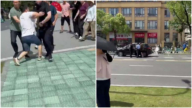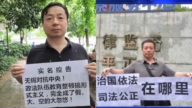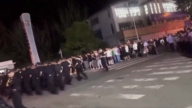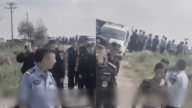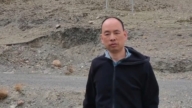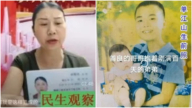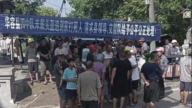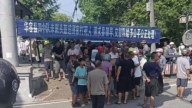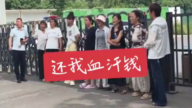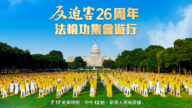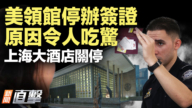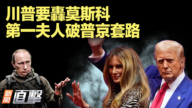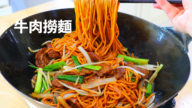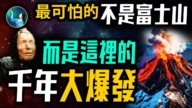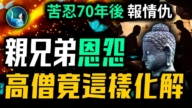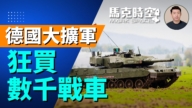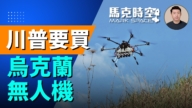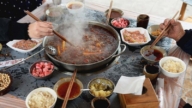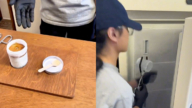【新唐人2014年03月14日讯】据中共最高人民检察院日前公布的数据,与2012年相较,去年各检察机关批准逮捕和提起公诉的人数都有所下降。美国人权组织“对话基金”分析指出,中共当局可能用刑事罪来起诉异议人士,以减少政治犯的人数。
3月10号,中共最高检察院在全国人大会议上公布的数据显示,去年,中国各检察机关共批准逮捕各类刑事犯罪嫌疑人近88万人,比2012年的97万人下降了10%,被提起公诉的人数也下降了5%。而因“危害国家安全罪”遭起诉的人数,则减少了21%,只有830人。
武汉人权活动家秦永敏:“数字不能说明任何问题,在中国,大家知道,常常说的数字都是假的。关于最高法院公告一些数据,我觉的没有实质意义。从中国社会现状看,整个社会正处在矛盾大爆发的前夜,各种各样的恶性事件层出不穷,举国上下都出现一些非常极端的案件,难道仅仅是当事人要走那个绝路吗?应该追究那些更深刻的原因。”
11号,总部位于美国的非政府组织“对话基金会”表示,中共最高检10号公布的报告显示,去年中国有830人被当局以“煽动颠覆国家政权罪”等危害国家安全的政治罪名起诉,比2012年下降了21%,是自2007年以来,被起诉政治犯人数最少的一年。但与此同时,去年被控“聚众扰乱公共秩序罪”的人数与2012年相比,增加了1万1千人。
“对话基金会”以去年被逮捕的李思华、刘萍和魏忠平为例,说明越来越多的中国异议人士被冠以与危害国家安全无关的罪名。可能是中共当局变换了策略,借此减少政治犯的人数。
据了解,中国公民刘萍、魏忠平、李思华等人,在刘萍家楼下空地举牌,声援因“要求官员公布财产”而被捕的公民赵常青、丁家喜等人,却被警方以“煽动颠覆国家政权”的罪名拘捕,检察机关在批准逮捕时,将罪名改为“非法集会”,之后法院又追加“聚众扰乱公共场所秩序”以及“利用邪教组织破坏法律实施”两项罪名。
广东律师隋牧青:“这样大面积的对民间打压,并不适用一些很严厉的罪名,比如说颠覆啊。他还有一个原因,因为中国政府是对外宣称没有政治犯,因为危害国家安全罪,国外都知道,这个就是政治,不适用,如果用过去国际上一些罪名,比如去公共场所寻衅滋事,在国际上就有一个欺骗的作用。”
“对话基金会”负责人康原(John Kamm)表示,大陆“新公民运动”倡导人,也是维权律师的许志永,于2012年到2013年间,组织了数起在中央政府机构外的示威,但没有受到危害国家安全的指控。今年1月,他被北京第一中级人民法院以“聚众扰乱公共秩序罪”获判4年监禁。
康原说,根据中国刑事诉讼法,除非“危害国家安全罪”或有关死刑或无期的案例,其他所有初犯案例都由地区法院审理。如果许志永案件与“危害国家政权”没有关系,为什么他会被中级法院审判?
隋牧青:“其实是把他当作意识形态的敌人来对待,国家的敌人来对待了。比如说会见,与律师会见,违法的监视、监听,还有开庭的时候,根本就不让去旁听,其实这个都是一种政治犯的对待,跟普通的刑事案件是两件事。”
秦永敏:“他既不是政治犯,也不是刑事犯,许志永先生的诉求是符合当今世界人类最基本的文明价值。不管他的诉求,还是所谓的行动,都不违反任何法律,像这样的案例,正好是反向之罚,把最杰出的精英所做的好事,当作他的罪来加以抓补,荒唐之极!”
北京异议人士胡佳向《自由亚洲电台》指出,尽管“扰乱公共秩序”、“寻衅滋事”等罪名的量刑上限,比“颠覆国家政权罪”要短,但这并不代表中共当局对异议人士更为宽容。这只能说明,中共当局比以前更狡诈了,既要达到对内震慑维稳的目地,又要尽可能减少来自国际社会的压力。
采访/朱智善 编辑/陈洁 后制/孙宁
Chinese Communist Party Changes Tactics: Political Prisoners Charged With Non-political Crimes.
Data was recently released by the Chinese Communist
Party’s (CCP) Supreme People’s Procuratorate (SPP).
It indicated that the number of arrests and indictments
taking place in 2013 decreased, in comparison to 2012.
The Dui Hua Foundation, which advocates human rights
in China, analyzed that the regime is shifting tactics.
It is prosecuting dissidents to reduce
the number of political prisoners.
On March 10, the SPP annual report was
delivered to the National People’s Congress.
The number of arrests in 2013 dropped to 880,000 from
970,000 in 2012, a decline of more than 10 percent.
Indictments fell five percent.
By 2013, indictments for endangering state security (ESS)
had declined by an estimated 21 percent year-on-year.
There were 830 people indicted,
according to the Dui Hua Foundation.
Qin Yongmin, human rights activist, Wuhan:
“The data says nothing about the real problem.
Everyone in China knows the data is false. I don’t think
the Supreme Procuratorate’s figures mean anything.
China is on the eve of outbreak of internal conflict, with all
sorts of serious incidents taking place throughout the country.
There are more than just isolated cases of extreme
severity. The profound reasons need to be investigated".
On March 10, the Dui Hua Foundation released its
analysis of arrests and indictments in China in 2013.
This was based on data from the SPP.
Chinese indictments for endangering state security had
declined by an estimated 21 percent year-on-year by 2013.
This was based on 830 people being indicted in
2013, and were at their lowest level since 2007.
The number of people indicted for “gathering in crowds to
disturb social order", increased by more than 11,000 in 2013.
The Dui Hua Foundation took dissidents Li Sihua,
Liu Ping and Wei Zhongping as examples
to explain the current change in CCP tactics.
It’s reducing the number of political dissidents
by charging them with crimes that are not
considered to be endangering state security.
It is understood that Liu Ping, Wei Zhongping and
Li Sihua held placards near Liu Ping’s apartment.
This act was to stand in solidarity
with Zhao Changqing and Ding Jiaxi.
Zhao and Ding were arrested for calling
for officials to declare their property.
The police arrested the three of them on
allegations of “inciting subversion of state power".
The prosecutors approved the arrest, but
revised the charge to “unlawful assembly".
The court later added two other crimes. The first
was “gathering in a crowd to disturb public order".
The second was “sabotaging legal enforcement
by organizing and using heretical religion".
Sui Muqing, Guangdong lawyer: “Charges with severe
offenses, such as subversion of state power, are not
applicable within the mass suppression of the society.
Also, the regime has claimed to the world
that there are no political prisoners in China.
The charge of subverting state power is well known as the
charge for political prisoners, so it therefore can’t be applied.
That’s why they have shifted to using other charges.
This includes disturbance in public places,
to deceive the international community."
The Dui Hua Foundation also used the example of the
well-known New Citizens Movement advocate, Xu Zhiyong.
Xu rallied the public to protest at multiple central
government bureaus between 2012 and 2013.
However, he was never charged
with endangering state security (ESS).
Beijing No.1 Intermediate People’s Court
sentenced him to four years’ imprisonment.
In January this year, he was charged with
“gathering a crowd to disturb public order".
“According to the Criminal Procedure Law,
with the exception of ESS cases or cases which
may involve life or death sentences, all trials of
first instance shall be tried by district courts.
If Xu was not charged with ESS (i.e., political) crimes, why
was he tried by an intermediate court?" analyzed Dui Hua.
Sui Muqing: “The regime has treated him
as an ideological enemy, a state enemy.
That is why the illegal surveillance and taping
were conducted during his meetings with lawyers.
Also, there was no public hearing during the
trial. He was treated like a political criminal.
It is completely different from an ordinary criminal case."
Qin Yongmin: “But he is not a criminal,
whether it is political or non-political.
What Mr. Xu Zhiyong demanded was the
most fundamental values of human society.
His quest and his acts have not violated
any law. A case like this is extremely absurd.
They penalize the good deeds of the distinguished elite!"
Beijing dissident Hu Jia spoke
to Radio Free Asia on this issue.
The sentencing caps of crimes such as “disturbing
public order" and “provocation" are shorter than
the crimes for “subversion of state power".
But that does not mean that the
regime is more tolerant to dissidents.
It only explains that the regime is being deceptive.
It is trying to “maintaining domestic stability" and
reduce pressure from the international community.
Interview/Zhu Zhishan Edit/Chen Jie Post-Production/Sun Ning


